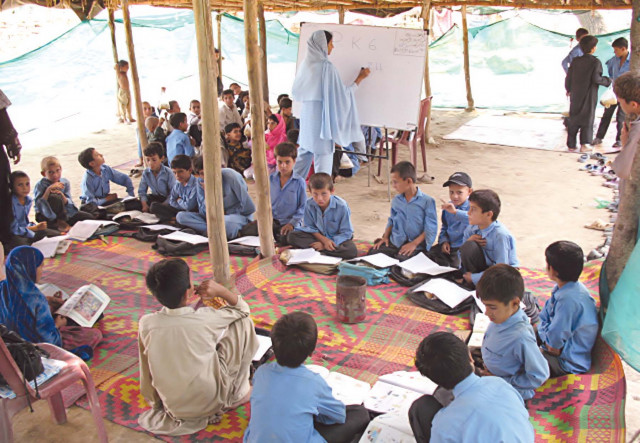The miracle of Pehli Kiran schools
A ray of hope for children of the slums.

The miracle of Pehli Kiran schools
These schools housed in the barest bamboo shacks have given birth to big dreams. Children born in these ghettoes aspire to become teachers, doctors and big sahibs. Will they ever realise their dreams when the dropout rate is so high that few reach grade 5, the highest level the Pehli Kiran schools would take them to.
Shazia Allahbakhsh, a student of second grade at Pehli Kiran school number 5 (PK-5), is confident of her parent’s support for her education. “My mother wants me to be a beautician, but I will be a doctor,” says Shazia, whose mother is a maid and father a gardener.
The schools are run by a charity organisation named the JAQ Trust, after late Jamshed Akhtar Qureshi, from whom a large donation was received in the year 2000. Of the 1,200 pupils studying in the primary school chain, 35 per cent are girls that can be taken as an indicator of social change that is taking place at society’s lowest level.
Yar Muhammad, a sharp Afghan boy in grade five, and one of his parents’ eight children, also aspires to be a doctor. “I came here in katchi (kindergarten), but passed a test and skipped class two,” he says, still seeming proud of an old accomplishment.
Muhammad, studying in Pehli Kiran’s school number 8, is well aware of his background and the wars his country has suffered from. “Twenty-five years ago my grandfather came from Afghanistan to Pakistan because of the war. I will go back to Afghanistan after completing my education. My friend went and he said the mountains there are very big.”
Situated in a slum of F-11, PK-8 has around 230 students, most of whom are Afghan refugees. “There are communication problems sometimes because many students are not familiar with Urdu. But we have a teacher here who knows Pashto, so she translates when the students do not understand certain words,” said head teacher Ghazanfar Ali.
Wherever the children go, the schools go with them. “Our schools are mobile. When the Capital Development Authority starts developing an area, people living in the slums are evicted. We then have to relocate the school to where the community resettles. The settlement where we first started has been razed to the ground,” said Zainab Qureshi whose mother runs the Trust, while she herself works at Developments in Literacy (DIL), an NGO.
The schools have also introduced various extra-curricular activities. Last year, the Pehli Kiran schools system started a “civics” curriculum to expose the students to basic civic values and ethics through art, music and theatre, said Founder and Manager Trustee, Sabira Qureshi.
Funding
The education trust is mainly funded by individual donors, a few companies and contributions made by trustees. Initially, the schools were funded entirely by the trustees’ own contributions.
It’s a success story, but shortage of funds often makes it difficult to keep things going as the Trust desires. “We used to give milk and fruit to the children once a week, but since March 2010, we have had to cut back on milk,” Sabira Qureshi told The Express Tribune via email, as she is temporarily based in the United States.
“We need to get more active about our funding. There is a severe deficit right now because people only know about our schools by word-of-mouth,” Zainab said. At present, the cost of sponsoring a child for a year is Rs4,300.
Sabira added that the schools were also affected by the floods of 2010, as regular donors diverted their charity to flood victims.
Teachers’ recruitment and training
“We try to recruit teachers with at least an Intermediate degree, but prefer some teaching experience. However, since we do not have too much of a choice, we have also employed teachers without any prior experience, but then we give them intensive training,” Sabira said.
For teachers who wish to continue their education during their employment, the trust pays half their tuition fee. Training is also given to volunteer teachers who come for a temporary period of time. “Before lessons we were given a very specific plan on how to conduct our class so we knew exactly what we were expected to do every few minutes,” said Hishaam Muzaffar, a student of A-levels second year and a former volunteer at the school.
Published in The Express Tribune, September 20th, 2011.



















COMMENTS
Comments are moderated and generally will be posted if they are on-topic and not abusive.
For more information, please see our Comments FAQ